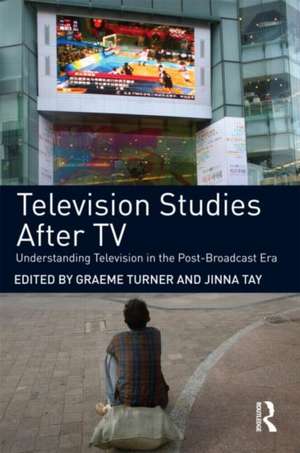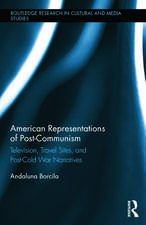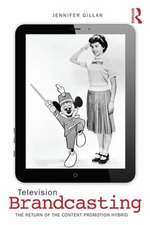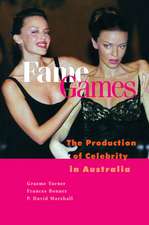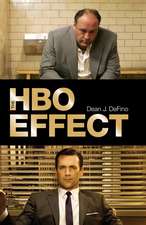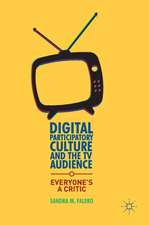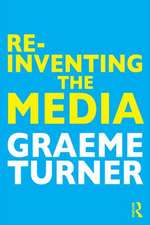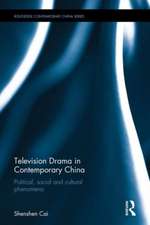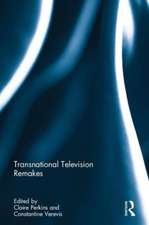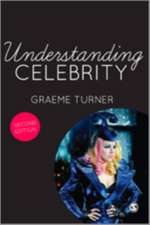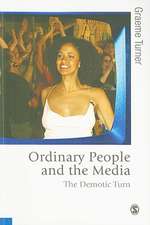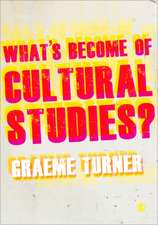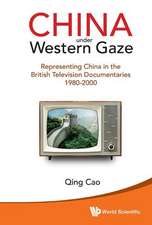Television Studies After TV: Understanding Television in the Post-Broadcast Era
Editat de Graeme Turner, Jinna Tayen Limba Engleză Paperback – 24 mar 2009
Television Studies after TV leads the way in developing new ways of understanding television in the post-broadcast era. With contributions from leading international scholars, it considers the full range of convergent media now implicated in understanding television, and also focuses on large non-Anglophone markets – such as Asia and Latin America — in order to accurately reflect the wide variety of structures, forms and content which now organise television around the world.
| Toate formatele și edițiile | Preț | Express |
|---|---|---|
| Paperback (1) | 354.35 lei 6-8 săpt. | |
| Taylor & Francis – 24 mar 2009 | 354.35 lei 6-8 săpt. | |
| Hardback (1) | 994.95 lei 6-8 săpt. | |
| Taylor & Francis – 26 mar 2009 | 994.95 lei 6-8 săpt. |
Preț: 354.35 lei
Nou
Puncte Express: 532
Preț estimativ în valută:
67.81€ • 70.40$ • 56.54£
67.81€ • 70.40$ • 56.54£
Carte tipărită la comandă
Livrare economică 24 martie-07 aprilie
Preluare comenzi: 021 569.72.76
Specificații
ISBN-13: 9780415477703
ISBN-10: 0415477700
Pagini: 224
Ilustrații: 2 black & white tables
Dimensiuni: 156 x 234 x 12 mm
Greutate: 0.41 kg
Ediția:New.
Editura: Taylor & Francis
Colecția Routledge
Locul publicării:Oxford, United Kingdom
ISBN-10: 0415477700
Pagini: 224
Ilustrații: 2 black & white tables
Dimensiuni: 156 x 234 x 12 mm
Greutate: 0.41 kg
Ediția:New.
Editura: Taylor & Francis
Colecția Routledge
Locul publicării:Oxford, United Kingdom
Public țintă
UndergraduateCuprins
Introduction. Graeme Turner and Jinna Tay Part I: What is Television? Introduction to Part I 1. Matrix Media. Michael Curtin 2. Less Popular but More Democratic? Corrie, Clarkson and the Dancing Cru. John Hartley 3. The Twenty-First Century Telescreen. Mark Andrejevic 4. Screens: Television’s Dispersed ‘Broadcast’. P. David Marshall. Part II: The Function of Post-Broadcast Television. Introduction to Part II 5. Television and the Nation: Does This Matter Any More? Graeme Turner 6. Between the Public and the Private: Television Drama and Global Partnerships in the Neo-Network Era. Serra Tinic 7. Approach with Caution and Proceed with Care: Campaigning for the US Presidency ‘After’ TV. Toby Miller 8. Reinventing Television: The Work of the ‘Innovation’ Unit. Stuart Cunningham. Part III: Television and Social Change. Introduction to Part III 9. Television Culture with ‘Chinese Characteristics’: The Politics of Compassion and Education. Wanning Sun and Yuezhi Zhao 10. Television in Chinese Geo-Linguistic Market: Deregulation, Reregulation and Market Forces in the Post-Broadcast Era. Jinna Tay 11. Television in the Balkans: The Rise of Commercial Nationalism. Zala Volcic 12. Anachronism, Apologetics and Robin Hood: Televisual Nationhood after TV. Stephanie Hemelryk Donald. Part IV: Television Content: What’s on Now? Introduction to Part IV 13. Latin America’s Impact on World Television Markets. John Sinclair 14. Reasserting the National? Program Formats, International Television and Domestic Culture. Albert Moran 15. From Monopoly to Polyphony: India in the Era of Television. Adrian Mabbott Athique 16. Fragmentation or Consolidation? Factors in the Oprah-ization of Social Talk on Multi-Channel Arab TV. Naomi Sakr 17. Globalizing Televised Culture: The Case of China. Anthony Fung. Bibliography. Index
Notă biografică
Graeme Turner is an Australian Research Council Federation Fellow and Director of the Centre for Critical and Cultural Studies at the University of Queensland in Brisbane, Australia. He has published widely in media and cultural studies and previous publications include British Cultural Studies: An Introduction (3rd edition 2003), Understanding Celebrity (2004), Ending the Affair: The Decline of Current Affairs Television in Australia (2005), and Film as Social Practice (4th edition 2006),
Jinna Tay is a Research Fellow with the Centre for Critical and Cultural Studies at the University of Queensland. She has published on television in Asia, fashion magazines and journalism and edited the ‘Creative Cities’ section of the Creative Industries Reader edited by John Hartley.
Jinna Tay is a Research Fellow with the Centre for Critical and Cultural Studies at the University of Queensland. She has published on television in Asia, fashion magazines and journalism and edited the ‘Creative Cities’ section of the Creative Industries Reader edited by John Hartley.
Descriere
Television Studies after TV leads the way in developing new ways of understanding television in the post-broadcast era. With contributions from leading international scholars, it considers the full range of convergent media now implicated in understanding television, and also focuses on large non-Anglophone markets – such as Asia and Latin America — in order to accurately reflect the wide variety of structures, forms and content which now organise television around the world.
